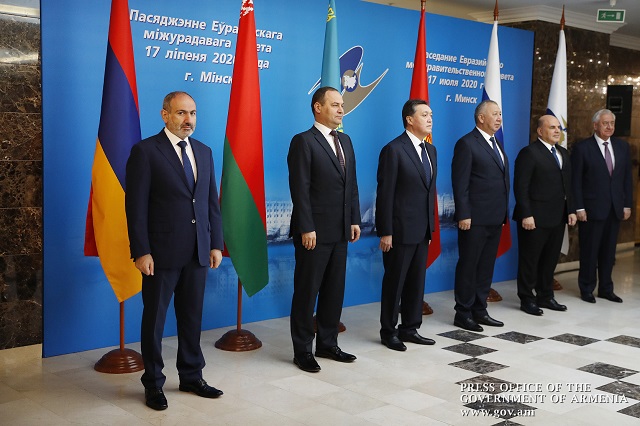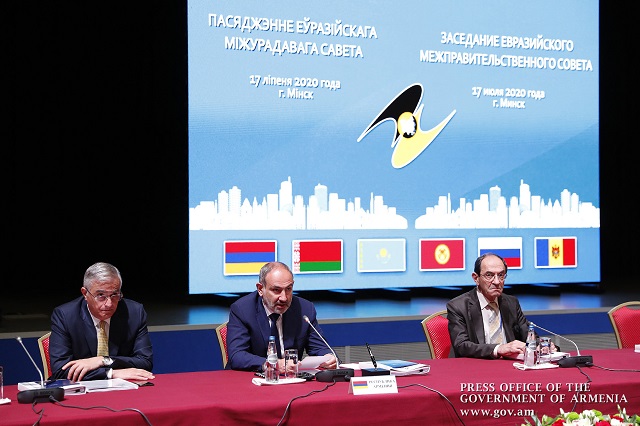Prime Minister Nikol Pashinyan, who is paying a working visit to Belarus, attended a regular meeting of the Eurasian Intergovernmental Council in Minsk. The meeting was also attended by RF Prime Minister Mikhail Mishustin, Prime Minister of the Republic of Belarus Roman Golovchenko, Prime Minister of the Republic of Kazakhstan Askar Mamin, Prime Minister of the Republic of Kyrgyzstan Kubatbek Boronov, Eurasian Economic Commission Board Chairman Mikhail Myasnikovich.
The Heads of Government first attended a joint photo session, after which the Intergovernmental Council met in narrow and expanded formats. Addressing the event, Nikol Pashinyan stated:
“Dear Heads of Government,
Dear members of delegations,
To begin with, I would like to thank Prime Minister of the Republic of Belarus Roman Alexandrovich Golovchenko for hosting today’s meeting, as well as for a warm welcome and hospitality.
Read also
Since this is the first meeting of the Eurasian Economic Council with the participation of Roman Alexandrovich and Kubatbek Ayylchievich, I wish to take this opportunity to congratulate both colleagues on their appointment as Prime Ministers of the Republic of Belarus and the Republic of Kyrgyzstan, respectively, and wish them good luck and ever new achievements in their responsible activities.
Dear friends,
This is our first face-to-face meeting after a long pause caused by the coronavirus pandemic. In this regard, I would like to note with satisfaction that our Union actually defied this challenge with honor. It proved viable in crisis situations, which evidences its importance for our countries.
The Commission did not interrupt its activities for even a second. The videoconferences held by the Commission Board, the Intergovernmental Council and the Supreme Eurasian Economic Council not only allowed us to exchange information on the state of affairs in our countries, but also allowed us to continue our discussions and take decisions fundamental to the future of our integration.
The Eurasian cooperation would not have been so effective if it had not been underpinned by strong ties of friendship between our countries and peoples. In this context, I would like to highlight the ongoing high-level cooperation and mutual assistance that we felt these days from all our partners without exception.
I would like to express my gratitude to Prime Minister Mikhail Mishustin and Deputy Prime Minister Alexei Overchuk for their prompt response to emerging challenges, in particular, as regards the efforts to ensure uninterrupted transport communication between Armenia and the Russian Federation. This was strategically important for our economy.
In the same context, I cannot but mention Belavia’s operations. During all these months it continued to operate regular flights to Armenia despite the fact that all other carriers had suspended their activities in Armenia.
Dear friends,
The epidemiological situation remains tense in Armenia despite the recent days’ encouraging statistics. The pandemic has negatively affected all aspects of our public life. It hit the economy and the social sector. The mobility of the population has decreased, trade in goods and services has been hampered. The healthcare system is facing unprecedented pressures.
All countries without exception are experiencing these difficulties to one extent or another. It is more than obvious that preserving peace and putting an end to armed conflict are prerequisites for waging a successful campaign against the pandemic and the economic crisis it has caused. In this regard, I cannot help addressing a topic that is vital for us and for regional stability.
As you may know, ignoring the numerous calls for an end to armed conflict amid the ongoing pandemic, including those reflected in the Joint Statement of the Supreme Eurasian Economic Council on April 14 and the UN Secretary-General’s statement of March 23, Azerbaijan resorted to military action on the northeast borders of the Republic of Armenia.
The armed forces of Armenia could not help but respond to these provocative actions of Azerbaijan. Unfortunately, provocations continue to this day, fostering tension and unpredictability.
Azerbaijan’s aggressive policy in the region leads nowhere. It will not succeed in breaking our people’s resolve and force us to make unreasonable and unilateral concessions in the settlement of the Nagorno-Karabakh conflict. There is no military solution to the conflict and there is no alternative to peace negotiations, which is in the interests of all peoples in our region.
Dear friends,
Now, I would like to dwell on the following agenda issues: First, I wish to state my overall satisfaction with the work done to create a common gas market for the Eurasian Economic Union, which is reflected in the report.
We are hopeful that the ongoing constructive efforts will be stepped up based on mutual understanding and respect for the interests of all EAEU-member States. Transition to market-based pricing mechanisms and setting tariffs (prices) for gas transmission services in the common market are among the topical objectives of this Program. We are confident that these principles constitute a key prerequisite for attaining the goals of the unified gas market formation.
I would also like to express our opinion on the agro-industry and industrialization development maps in the Eurasian economic space. We consider it appropriate to have large projects in the aforementioned maps that would imply interstate cooperation, mutual deliveries of raw materials or finished products, as well as projects aimed at developing and implementing innovative technological solutions.
As regards the Union’s industrialization map, it may become a mechanism to further stimulate cooperation and promote joint import-substitution projects, as well as to assess the potential of member countries’ industries. The industrialization map will help us make a better use of resources in each member state and support those enterprises cooperating with their partners from other member states.
I would also like to emphasize the importance of joint action in the field of healthcare, sanitary and epidemiological welfare to prevent the spread of COVID-19.
In conclusion, I wish to focus on the issue of food security. I would like to note that food security has always been the center of our attention. As far as I know, specific preliminary work has already been done in this direction within the Union. Moreover, we have agreed to develop the general principles and approaches to food security in the EAEU Strategy for up to 2025. This problem has become particularly relevant amid the standing pandemic, and therefore, I suggest entrusting the Commission with the task of developing and submitting the EAEU Food Security Doctrine (Concept).
Wrapping up my remarks, I would like to remind you that Armenia has expressed readiness and reaffirms its wish to organize the next regular session of the Eurasian Intergovernmental Council in Yerevan in October this year. Thank you.”
A wide range of issues of Eurasian integration in the areas of trade, the functioning of the domestic market, competition, industry, technical regulation and others was discussed during the meeting. Reference was made to the implementation of the “Agreement on Labeling of Goods” and the further development of the labeling system within the Eurasian Economic Union, a comprehensive healthcare action plan to prevent the spread of COVID-19 and other infectious diseases in member countries.
The meeting also discussed a draft interstate program for cooperation among the EAEU countries, a roadmap for agro-industry development and a map for the industrialization of the EAEU.
The aforementioned two projects provide for exchange of information on major projects, which will allow the Union’s partners to avoid the duplication of production, take note of development trends and effectively use each other’s capabilities when forming national development plans and investment programs.
During the extended meeting, the Heads of Government signed the minutes of the meeting and the documents on the decisions passed at the meeting.
INFORMATION AND PUBLIC RELATIONS DEPARTMENT OF THE OFFICE OF THE PRIME-MINISTER OF THE REPUBLIC OF ARMENIA




















































